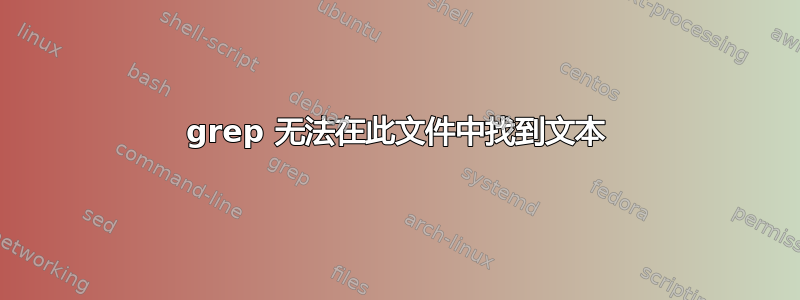
我克隆了git一个项目的源代码,以前我grep在整个项目中查找某个单词,SchemaHandler却grep在这个奇怪的代码文件里找不到该单词:
是的,我承认这不是标准文本文件,但grep它也能在二进制文件中查找字符串。事实上,它能够在项目的两个 jar 文件中查找到该单词。为什么这个文本文件会失败?
我使用的命令位于grep -R SchemaHandler .克隆项目的根目录中。
我用大号Ubuntu 18.0.4 和grep3.1
答案1
确实找到了。问题是该文件有一个回车符 ( \r),这导致文件名被终端隐藏。为了说明我的意思,请比较以下两个命令:
printf "foobar\n"
和
printf "foo\rbar\n"
每个都应该打印以下内容:
$ printf "foobar\n"
foobar
$ printf "foo\rbar\n"
bar
第二条命令仍在打印foo,但\r导致终端返回到行首,因此它被覆盖。您可以使用od以下方法查看它:
$ printf "foo\rbar\n" | od -c
0000000 f o o \r b a r \n
0000010
当你运行时也会发生类似的事情grep -R:
$ git clone https://github.com/yawlfoundation/yawl
$ cd yawl
$ grep -R SchemaHandler . | grep YDataValidator
} } return schema ; .replaceAll("type=\"", "type=\"xs:"); xmlns:xs");pes, soonn) e;
乍一看,结果似乎很奇怪。 为什么 会YDataValidator返回一行似乎不包含字符串grep YDataValidator? 答案是\r。 该行实际上来自文件YDataValidator.java,但文件名被 遮住了。 如果您告诉仅打印匹配的字符串及其周围的几个字符,\r您可以更清楚地看到这一点:grep
$ grep -PRo '.{10}SchemaHandler.{10}' . | grep YDataVal
* @a/org/yawlfoundation/yawl/schema/YDataValidator.java:d using a SchemaHandler.
./src/org/yawlfoundation/yawl/schema/YDataValidator.java: private SchemaHandler handler;
./src/org/yawlfoundation/yawl/schema/YDataValidator.java:ler = new SchemaHandler(schema);
./src/org/yawlfoundation/yawl/schema/YDataValidator.java: SchemaHandler handler =
./src/org/yawlfoundation/yawl/schema/YDataValidator.java: new SchemaHandler(DOMUtil.g
这里,由于中\r5 个 实例周围的 10 个字符中没有,因此名称显示正确。您的原始命令返回了整个文件(整个文件只是一行,在 Linux 中没有定义换行符),因此您看到的是一行很长的行,由于 而出现乱码。SchemaHandlerYDataValidator.java\r\r
你可以通过运行以下命令进行验证:
$ grep SchemaHandler ./src/org/yawlfoundation/yawl/schema/YDataValidator.java
} } return schema ; .replaceAll("type=\"", "type=\"xs:"); xmlns:xs");pes, soonn) e;
然后将输出与\r用换行符替换所有内容后得到的结果进行比较:
$ grep SchemaHandler ./src/org/yawlfoundation/yawl/schema/YDataValidator.java | tr '\r' '\n'
/*
* Copyright (c) 2004-2012 The YAWL Foundation. All rights reserved.
* The YAWL Foundation is a collaboration of individuals and
* organisations who are committed to improving workflow technology.
*
* This file is part of YAWL. YAWL is free software: you can
* redistribute it and/or modify it under the terms of the GNU Lesser
* General Public License as published by the Free Software Foundation.
*
* YAWL is distributed in the hope that it will be useful, but WITHOUT
* ANY WARRANTY; without even the implied warranty of MERCHANTABILITY
* or FITNESS FOR A PARTICULAR PURPOSE. See the GNU Lesser General
* Public License for more details.
*
* You should have received a copy of the GNU Lesser General Public
* License along with YAWL. If not, see <http://www.gnu.org/licenses/>.
*/
package org.yawlfoundation.yawl.schema;
import org.jdom2.Element;
import org.yawlfoundation.yawl.elements.data.YVariable;
import org.yawlfoundation.yawl.exceptions.YDataValidationException;
import org.yawlfoundation.yawl.schema.internal.YInternalType;
import org.yawlfoundation.yawl.util.DOMUtil;
import org.yawlfoundation.yawl.util.JDOMUtil;
import org.yawlfoundation.yawl.util.StringUtil;
import javax.xml.XMLConstants;
import java.util.*;
/**
* This class serves as a validation mechanism for the specification specific
* schema and the instance data from either the net or a task. This is performed
* by taking the data available at the various validation points and converting
* it into conventional XML which is then validated using a SchemaHandler.
*
* @author Mike Fowler
* Date: 05-Jul-2006
*/
public class YDataValidator {
// Object that performs the real validation on XML documents
private SchemaHandler handler;
/**
* Constructs a new validator and handler. The
* handler is not ready for use until validateSchema
* has been called.
* @param schema a W3C XML Schema
*/
public YDataValidator(String schema) {
this.handler = new SchemaHandler(schema);
}
/**
* Compiles and determines the validity of the current schema
* @return true if the schema compiled without error.
*/
public boolean validateSchema() {
return handler.compileSchema();
}
/**
* Validates a single data variable
*
* @param variable to be validated
* @param data XML representation of variable to be validated
* @param source
* @throws YDataValidationException if the data is not valid
*/
public void validate(YVariable variable, Element data, String source)
throws YDataValidationException {
List<YVariable> vars = new ArrayList<YVariable>(1);
vars.add(variable);
validate(vars, data, source);
}
/**
* Validates a collection of variables against the schema. This is achieved by
* temporarily adding a schema element declaration for the data. This avoids
* attempting to create a new schema containing only the relevant data types.
*
* @param vars variables to be validated
* @param data XML representation fo the variables to be validated
* @param source
* @throws YDataValidationException if the data is not valid
*/
public void validate(Collection vars, Element data, String source)
throws YDataValidationException {
try {
String schema = ensurePrefixedSchema(handler.getSchema());
org.w3c.dom.Document xsd = DOMUtil.getDocumentFromString(schema);
String ns = XMLConstants.W3C_XML_SCHEMA_NS_URI;
//need to determine the prefix for the schema namespace
String prefix = ensureValidPrefix(xsd.lookupPrefix(ns));
org.w3c.dom.Element element = xsd.createElementNS(ns, prefix + "element");
element.setAttribute("name", data.getName());
org.w3c.dom.Element complex = xsd.createElementNS(ns, prefix + "complexType");
org.w3c.dom.Element sequence = xsd.createElementNS(ns, prefix + "sequence");
ArrayList varList = new ArrayList(vars);
Collections.sort(varList); // sort on YParameter ordering value
for (Object obj : varList) {
YVariable var = (YVariable) obj;
org.w3c.dom.Element child = xsd.createElementNS(ns, prefix + "element");
child.setAttribute("name", var.getName());
String type = var.getDataTypeName();
if (XSDType.isBuiltInType(type)) {
type = prefix + type;
}
else if (YInternalType.isType(type)) {
type = prefix + type;
xsd.getDocumentElement().appendChild(DOMUtil.getDocumentFromString(
YInternalType.valueOf(type).getSchemaString()).getDocumentElement());
}
child.setAttribute("type", type);
if (var.isOptional()) {
child.setAttribute("minOccurs", "0");
}
sequence.appendChild(child);
}
complex.appendChild(sequence);
element.appendChild(complex);
xsd.getDocumentElement().appendChild(element);
SchemaHandler handler =
new SchemaHandler(DOMUtil.getXMLStringFragmentFromNode(xsd));
if (! handler.compileSchema()) {
throw new YDataValidationException(
handler.getSchema(),
data,
handler.getConcatenatedMessage(),
source,
"Problem with process model. Failed to compile schema");
}
if (! handler.validate(JDOMUtil.elementToString(data))) {
throw new YDataValidationException(
handler.getSchema(),
data,
handler.getConcatenatedMessage(),
source,
"Problem with process model. Schema validation failed");
}
}
catch (Exception e) {
if (e instanceof YDataValidationException) throw (YDataValidationException) e;
}
}
/**
* @return String representation of the schema
*/
public String getSchema() {
return handler.getSchema();
}
/**
* @return All error/warning messages relating to the last validation/compilation
*/
public List<String> getMessages() {
return handler.getMessages();
}
/**
* @return the set of (first-level) type names defined in this schema
*/
public Set<String> getPrimaryTypeNames() {
return handler.getPrimaryTypeNames();
}
/**
* Utility method to ensure the prefix is valid (enforces : and
* defaults to xs:)
*
* @param prefix to validate
* @return validated prefix
*/
private String ensureValidPrefix(String prefix) {
if (StringUtil.isNullOrEmpty(prefix)) {
return "xs:";
}
else if (! prefix.endsWith(":")) {
return prefix + ":";
}
return prefix;
}
/**
* A schema may not have a valid prefix if a spec contains no complex types, so
* this makes sure it gets one in that case
* @param schema the schema string to check
* @return a correctly (or defaultly) prefixed schema string
*/
private String ensurePrefixedSchema(String schema) {
if (!schema.contains(":schema")) {
schema = schema.replaceFirst("schema xmlns", "schema xmlns:xs");
schema = schema.replaceAll("<", "<xs:")
.replaceAll("<xs:/", "</xs:")
.replaceAll("type=\"", "type=\"xs:");
}
return schema ;
}
}
或者,您可以将输出通过管道传输到寻呼机,类似将less显示的寻呼机,还可以帮助您识别所需的行。\r^M
答案2
也许更像是评论,但我运行grep你的文件没有问题。我点击了你的链接,然后点击raw右键,Select All然后将文本保存到文件中并运行:
$ grep -R SchemaHandler
greptext: * it into conventional XML which is then validated using a SchemaHandler.
greptext: private SchemaHandler handler;
greptext: this.handler = new SchemaHandler(schema);
greptext: SchemaHandler handler =
greptext: new SchemaHandler(DOMUtil.getXMLStringFragmentFromNode(xsd));
希望经常使用的人github可以描述为什么原始文本对我有用以及为什么克隆对其他人不起作用。


